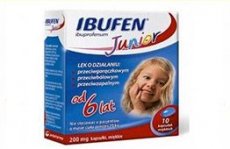Medical expert of the article
New publications
Preparations
Ibufen Junior
Last reviewed: 23.04.2024

All iLive content is medically reviewed or fact checked to ensure as much factual accuracy as possible.
We have strict sourcing guidelines and only link to reputable media sites, academic research institutions and, whenever possible, medically peer reviewed studies. Note that the numbers in parentheses ([1], [2], etc.) are clickable links to these studies.
If you feel that any of our content is inaccurate, out-of-date, or otherwise questionable, please select it and press Ctrl + Enter.

Medicinal preparation Ibufen Junior is a non-steroidal anti-inflammatory drug whose active ingredient is ibuprofen, as a therapeutically active ingredient included in such generics as Ibuprex, Ibuprof, Ibusan, Ipren, Nurofen, Brufen, and others.
 [1]
[1]
Indications Ibufen Junior
Anti-inflammatory, antipyretic and analgesic drug Ibufen Junior in pediatrics is recommended not only for complex treatment of acute respiratory viral infection and influenza, but also for possible reactions that often occur after vaccination of children, as well as to relieve pain of various etiologies, including painful teething.
Release form
Form of release Ibufen Junior - in the form of suspension for internal use (in bottles of 100 ml); in the package there is a spoon-dispenser or dispenser in the form of a syringe.

Pharmacodynamics
The active substance ibuprofen determines the pharmacodynamics of Ibufen Junior, which is related to the ability of ibuprofen to reduce the activity of the cyclooxygenase enzyme, which helps to reduce the intensity of the synthesis of prostaglandins - present in all tissues and organs of lipid mediators of the neurohumoral system of the body. Due to this, the body temperature decreases during inflammatory processes, the inflammatory reactions themselves are neutralized, and the pain syndromes disappear.
Pharmacokinetics
After ingestion of the drug, Ibufen Junior ibuprofen is absorbed in the gastrointestinal tract and binds to blood proteins; in plasma of blood the highest concentration is reached approximately in 60-90 minutes after reception. At the same time, the decrease in elevated temperature begins only half an hour after taking Ibufen Junior, with a full normalization of the temperature after three hours.
Biochemical transformation of the drug occurs in the liver; a significant part of the metabolites and a certain amount of unchanged ibuprofen is excreted by the kidneys (half-time taken half an hour - almost two hours). In the body, Ibupen Junior does not accumulate and is excreted completely within 24 hours.
Dosing and administration
The drug is taken orally, after eating (you can drink it with water). Dosage is determined by the doctor individually - depending on the diagnosis, age and body weight of the child. Children 3-12 months - 2.5 ml 3 times a day; 1-3 years - 5 ml (three times during the day); 4-6 years - 7.5 ml each; 7-9 years - 10 ml each; 10-12 years (30-40 kg) - 15 ml 3 times a day. The drug can be taken within three days.
With pain and high temperature in children, the daily dose is determined from the calculation of 20-30 mg per kilogram of body weight and is taken 3-4 times, but not earlier than 4 hours after the next intake. After vaccination, 2.5 ml of Ibufen Junior Suspension is prescribed - in one session.
Use Ibufen Junior during pregnancy
The use of Ibufen Junior during pregnancy in I and II trimesters is not recommended (there is no information on its safety for the mother and fetus). And use this drug in the third trimester of pregnancy is strictly prohibited.
Contraindications
First of all, contraindications for use include individual hypersensitivity to the active substance of the drug (ibuprofen), as well as to all non-steroidal anti-inflammatory drugs.
Ibufen Junior is not used for allergies to aspirin, ulcerative lesions of the stomach and intestines, with reduced blood clotting, liver and kidney disorders, high blood pressure and heart failure. This drug should not be taken before surgery.
Side effects Ibufen Junior
Although this medication is usually well tolerated, there may be the following side effects of Ibufen Junior: headache and dizziness, sleep disturbances and irritability, nausea and vomiting, digestive and stool disorders, increased blood pressure and cardiac rhythm disturbances, etc.
In case of an allergic reaction to this drug, skin itching and rashes, bronchospasm, Quincke's edema and anaphylactic shock can be observed.
Overdose
Overdose of this drug is accompanied by headache, nausea, vomiting, pain in the stomach, increased drowsiness, lower blood pressure and heart rhythm disturbances. At a significant level of overdose can be: a mixture of acid-base balance of the body towards increased acidity, seizures, partial dysfunction of the kidneys and liver, fainting, stopping breathing. In case of an overdose, it is necessary to rinse the stomach and take activated charcoal.
Interactions with other drugs
Ibupen Junior can not be taken concurrently with other non-steroidal anti-inflammatory drugs.
In addition, Ibufen Junior reduces the effectiveness of diuretics and medicines for the treatment of hypertension and arterial hypotension. With simultaneous use with anticoagulant drugs, Ibufen Junior enhances their therapeutic effect. It can increase the likelihood of side effects of corticosteroids.
Attention!
To simplify the perception of information, this instruction for use of the drug "Ibufen Junior" translated and presented in a special form on the basis of the official instructions for medical use of the drug. Before use read the annotation that came directly to medicines.
Description provided for informational purposes and is not a guide to self-healing. The need for this drug, the purpose of the treatment regimen, methods and dose of the drug is determined solely by the attending physician. Self-medication is dangerous for your health.

